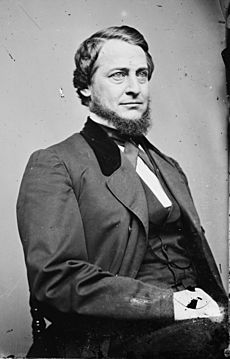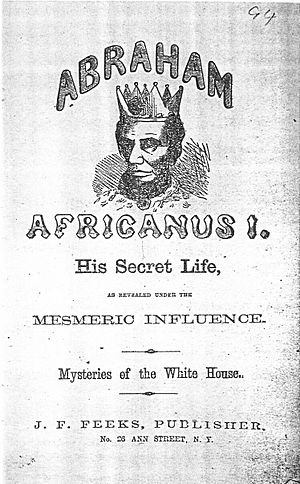Copperhead (politics) facts for kids
Quick facts for kids
Copperhead Democrats
|
|
|---|---|
| Historical leaders | Clement Vallandigham Alexander Long |
| Founded | 1860 |
| Dissolved | 1868 |
| Ideology | Opposed to U.S. Civil War Traditionalism Jacksonianism Anti-abolitionism |
| National affiliation | Democratic Party |
During the 1860s, a group of Democrats in the Northern United States were called the Copperheads. They were part of the Union during the American Civil War. These Copperheads strongly disagreed with the war and wanted it to end quickly. They hoped for a peace agreement with the Confederates.
The name "Copperheads" was given to them by Republicans. Republicans thought these anti-war Democrats were like a venomous snake called a copperhead. But the Democrats who were called Copperheads liked the name. They said the "copper head" part reminded them of the head of Lady Liberty. They even cut out the Liberty head from old Liberty Head large cent coins and wore them as badges. Democrats who supported the war were known as War Democrats.
The Copperheads were the most extreme part of the "Northern Democrats." Two well-known Copperhead leaders were Clement Vallandigham and Alexander Long, both congressmen from Ohio. Some important Copperheads were even accused of treason in 1864, but these accusations were often politically motivated.
What Did the Copperheads Want?
During the American Civil War (1861–1865), the Copperheads said they supported the Union. However, they strongly opposed the war. They blamed the war on abolitionists, who wanted to end slavery. The Copperheads demanded that the war stop right away. They also resisted laws that forced people to join the army, known as draft laws.
They wanted to remove President Abraham Lincoln and the Republicans from power. The Copperheads saw Lincoln as a ruler who was destroying American values. They believed he was acting like a dictator and taking away people's freedoms.
Some Copperheads even tried to convince Union soldiers to leave the army. They talked about helping Confederate prisoners of war escape from their camps. Sometimes, they met with Confederate agents and accepted money from them. The Confederacy encouraged these actions whenever they could.
How Did the Copperheads Resist?

The Copperheads sometimes talked about fighting back with violence. In some cases, they even started to organize groups. However, they never actually launched an organized attack. Because they were against the war, Copperheads were often suspected of not being loyal to the Union. Their leaders were sometimes arrested and held in military prisons for months without a trial.
A famous example happened in 1863. General Ambrose Burnside issued an order in Ohio called General Order Number 38. This order made it a crime to criticize the war in any way. If you broke this rule, you would be tried in a military court. Ohio congressman Clement Vallandigham was arrested for criticizing this very order. President Lincoln changed Vallandigham's punishment. Instead of prison, he was sent away to the Confederacy.
One of the largest Copperhead groups was the Knights of the Golden Circle. It started in Ohio in the 1850s and became more involved in politics in 1861. This group later changed its name to the Order of American Knights in 1863. Then, in early 1864, it became the Order of the Sons of Liberty, with Vallandigham as its leader. One leader, Harrison H. Dodd, suggested a violent overthrow of the governments in Indiana, Illinois, Kentucky, and Missouri in 1864. However, Democratic party leaders and a government investigation stopped his plan.
Even with this setback, tensions remained high. The Charleston Riot happened in Illinois in March 1864. Later, Republicans in Indiana used the discovery of an anti-war Copperhead plot by some members of the Sons of Liberty to make Democrats look bad in the 1864 House elections. A military trial of Lambdin P. Milligan and other Sons of Liberty members showed their plans to free Confederate prisoners in the state. The people involved were sentenced to be hanged. But the Supreme Court stepped in with a case called ex parte Milligan. The Court said that these people should have had trials in civilian courts, not military ones.
See also
 In Spanish: Copperheads para niños
In Spanish: Copperheads para niños
 | Isaac Myers |
 | D. Hamilton Jackson |
 | A. Philip Randolph |


